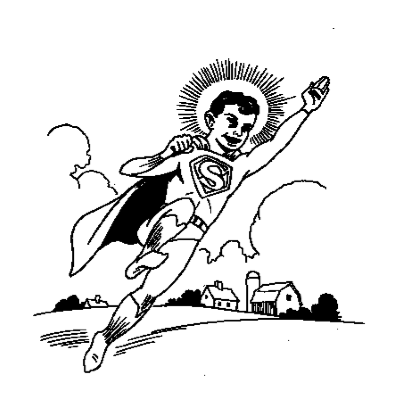1. GOD, COMMUNISM, AND THE WB
Smallville, a show on the WB network seducing America’s adolescents with visions of an acne- and largely parent-free world, relates the coming-of-age story of two young men: Superman, prior to his days of telephone booths and capes, and his future arch-enemy and global menace, Lex Luthor. Eventually, as we all know, these two will move to Metropolis and become the very yin and yang of apocalypse and salvation. In the tiny Kansan burg of Smallville, however, these future foes are, as yet, shoulder-slapping buddies. By providing American teens with Clark’s and Lex’s saga, the show tries to evoke the antediluvian world of superhero-dom, the world predating the complete separation of God and Satan, before the latter was cast out by God into the dark underworld.
Let’s not pull any punches here: the show, quite simply, is suffused with Christian propaganda. Clark appears on a crucifix in the very first episode, after being abducted by a gang of football players on an annual hazing mission. In another episode he is bathed in a halo of light as he rescues a boy from the jaws of a trash compactor. Once, in a graveyard, the camera frames Clark with the wings of an angel who presides over a Smallville resident’s crypt.1 Every time Clark’s spaceship is unearthed for inspection or theft, it appears to have a cross imprinted on its battered exterior. Almost every episode has some vaguely apt Biblical citation, such as a throwaway reference to the Holy Grail, three wise men, or Roman barbarism. In the opening credits, the pop band Remy Zero croons the lyrics: “Somebody save me / Don’t care how you do it / I’ve been waiting for you / I’ll make this whole world shine for you.”2
But beneath the more apparent Christian overtones runs a covert propaganda stream of a far more startling and inexplicable sort: dyed-in-the-wool communist rhetoric. If Smallville had aired during another era, the scriptwriters would have been blacklisted and tried by the House Un-American Activities Committee, alongside Dashiell Hammett and Lillian Hellman. It is true, in the first few episodes, all evil hails from the meteor rocks that accompanied Clark on his voyage to earth. But in short order, the plot turns its attentions to the dangers emanating from the booming metropolis of Metropolis, whence the devilish effects and demands of capitalism always originate. The nearby burg is constantly threatening Smallville’s tranquil idyll with the crude venality of its urban ethos.3 In its persistent indictment of all that is urban, Smallville teaches that capitalism should be feared and distrusted. Its residents persistently battle the possibility that all...
You have reached your article limit
Sign up for a digital subscription and continue reading all new issues, plus our entire archives, for just $1.50/month.
Already a subscriber? Sign in





